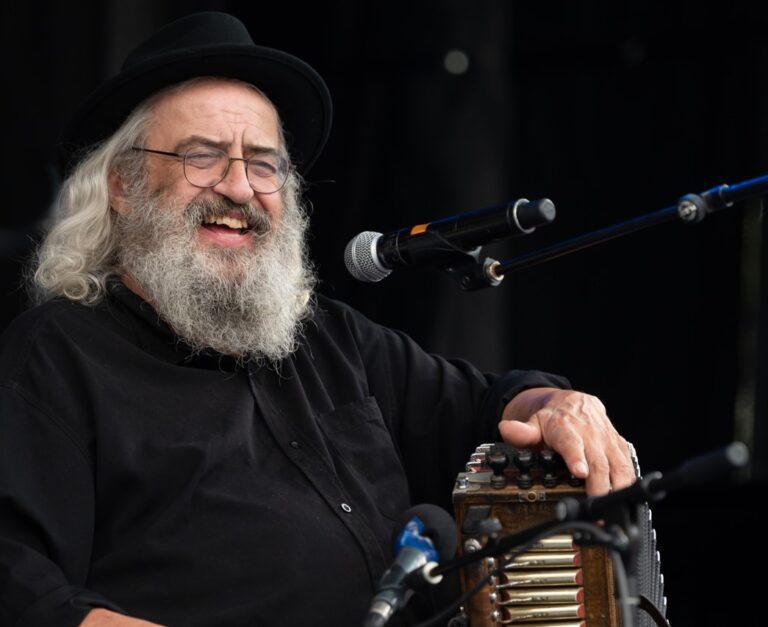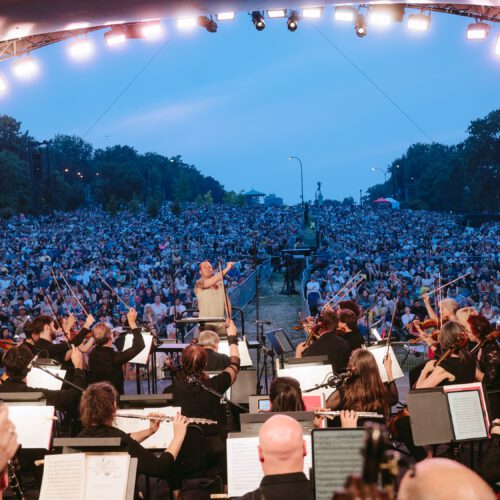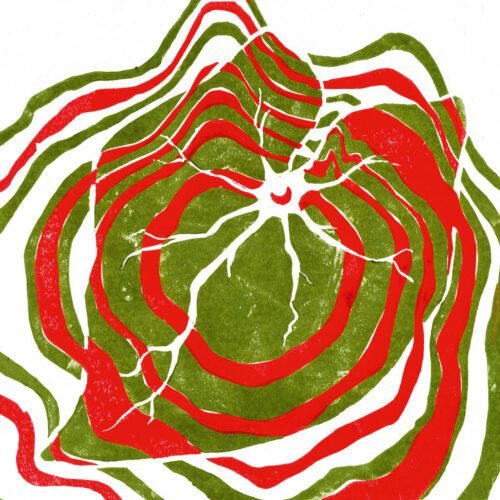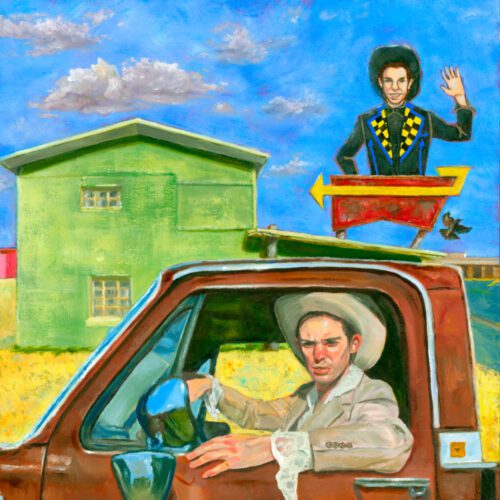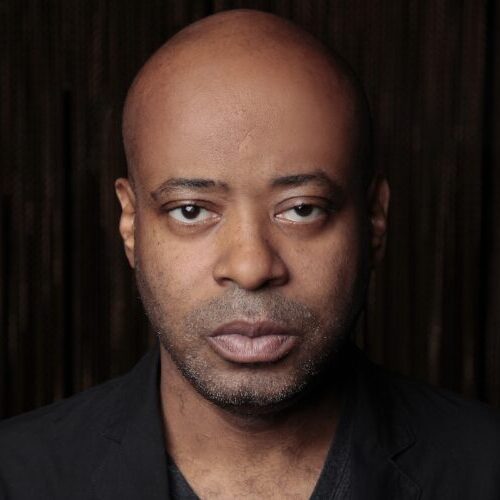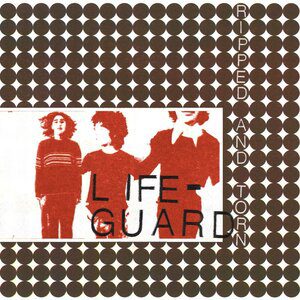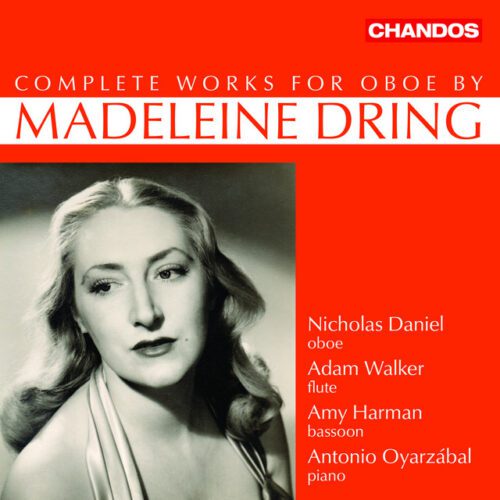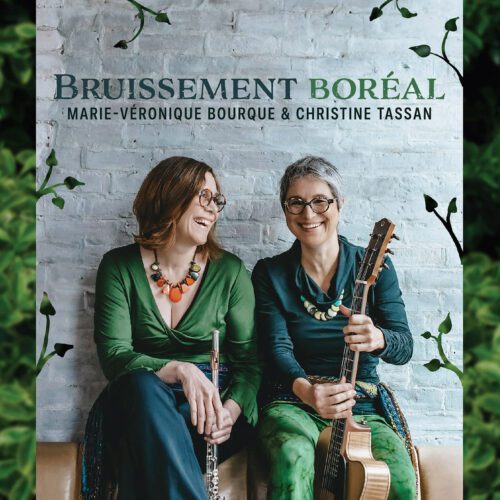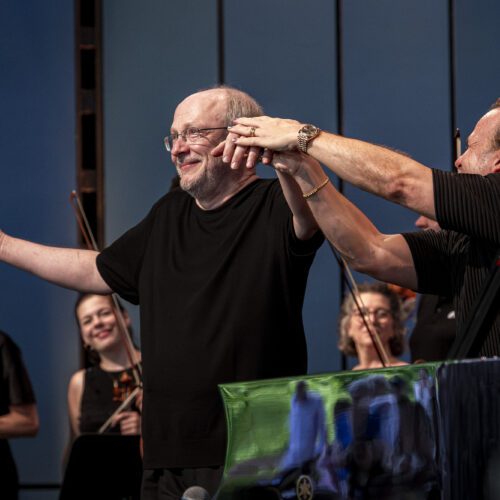Throughout the Labor Day weekend, Mont-Tremblant’s pedestrian village was filled to capacity, and the near-perfect weather certainly contributed to the winning conditions for its main event, the Fête de la Musique, presented for the 23rd time since the first, 28 years earlier. Angèle Dubeau’s artistic direction stayed the course: consensus-based choices of quality classical and pop music, and a unifying eclecticism, from Western pop to Balkan or Afro-Latin accents. Here are some of the highlights, compiled by PAN M 360.
Jean-Michel Blais, neoclassicism and deep humanity
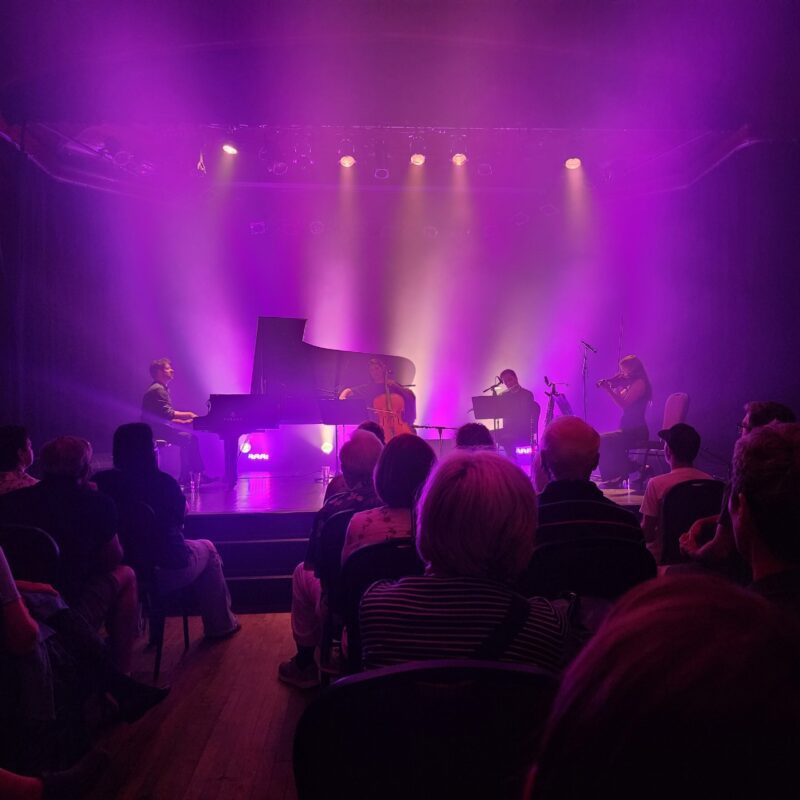
In this charming little church in Mont-Tremblant, a once sacred place transformed into a concert hall without losing its original aroma, Jean-Michel Blais presented a reduced version of his music for chamber orchestra on Friday. Aubades is certainly appreciated by neoclassical audiences.
Seduced by strictly acoustic composition for an ensemble requiring polyphonic rigor and thus an acceptable mastery of classical language, the musician puts aside his production skills and concentrates on his piano playing, instrumental composition and his more recently acquired skills as an arranger. We won’t repeat here the debate on neoclassicism’s triumph among twentysomethings, thirtysomethings and beyond… This approach has obvious limits but, whatever one thinks of it, remains a zone of elevation for music-lovers fed up with pop and its Indian variations.
Super-friendly, intelligent and unpretentious despite his remarkable success, Jean-Michel Blais doesn’t reinvent the wheel, but nevertheless puts his melodic skills to the service of chamber music. Melodies and tonal harmonies, tight counterpoint, four-part instrumentation: piano, cello, violin, woodwinds. The scores are not overly complex, and the music may seem predictable to anyone familiar with Romantic and modern music (late 19th/early 20th century), or with a number of French film scores, but it nevertheless demands rigorous execution from the performers involved. All in all, a very pleasant moment with a human being who fully deserves the success he is currently enjoying.
Kleztory… anything but kleztheoretical
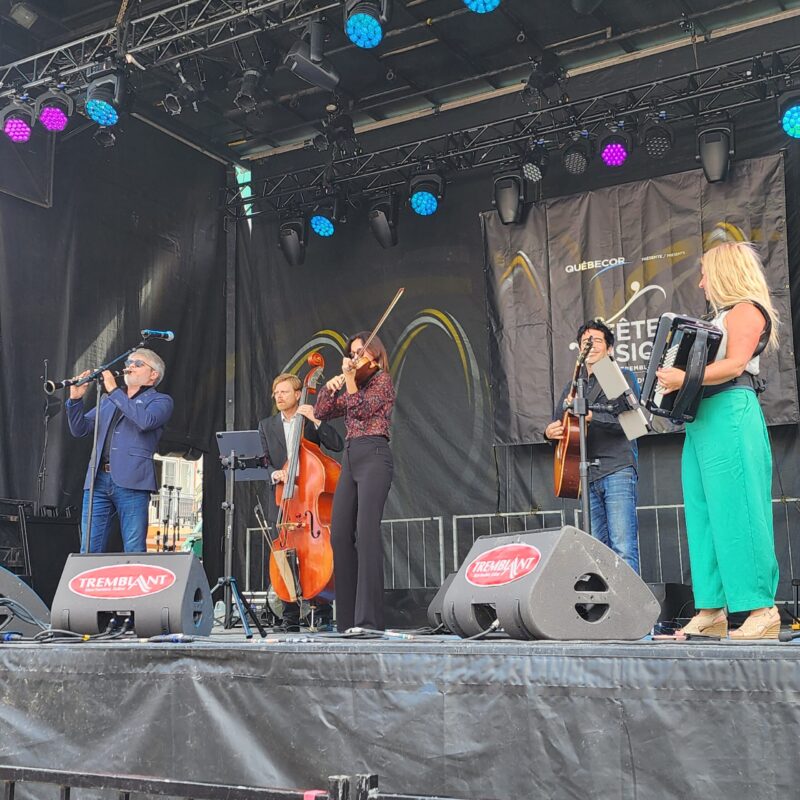
The group is made up of Elvira Misbakhova (violin), Airat Ichmouratov (clarinet, bass clarinet, duclar), Mark Peetsma (double bass), Raphaël D’Amours (guitar), Mélanie Bergeron (accordion). Elvira, also a violinist with I Musici de Montréal and violist with the Orchestre Métropolitain, and Airat, a post-romantic composer increasingly played by our orchestras, founded the group shortly after arriving in Quebec in the 90s. Kleztory remains an important project for these classical musicians, as they seek out specialized performers, particularly in Balkan music, more specifically that which dominated before the forced migrations and exactions caused by Nazism in the ’30s. Over the years, Kleztory has managed to get closer to the spirit of klezmer and other compatible music such as jazz. Elvira, the virtuoso of this group, is more supple and sensual than ever, with a host of excellent musicians. In addition to klezmer, the Jewish music of Kleztory and its modal explorations with quarter tones, you’ll be able to experience it once again, on September 21 at Salle Bourgie, with a bonus pianist, David Ryshpan.
Anything but… kleztheoretical!
Charles Richard-Hamelin, cultural mediation at Tremblant
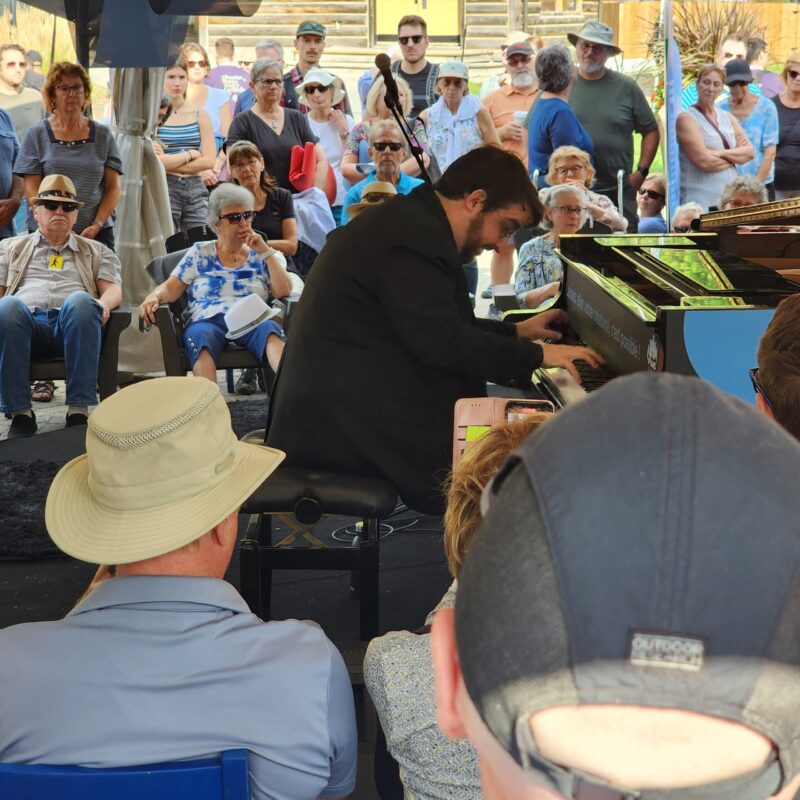
Given his already immense stature and stature, pianist Charles Richard-Hamelin might well not lend himself to this type of cultural mediation, refusing to take part in the crowds at a small festival. But no! The virtuoso, certainly one of our country’s most accomplished pianists, at least in the Canadian top 5, remains humble and accessible. Set up in a small tent, surrounded by curious music lovers who had come to meet him, the pianist lent himself to the game four times, no less. One of these hour-long performances consisted of providing details of his famous second-place finish at the Chopin Competition, arguably the most prestigious piano competition on Earth, 2nd place won in 2016 among 450 excellent performers, “a bit like the piano Olympics”. He played a little-played piece by Chopin, the Allegro de concert, Op. 46, during which you could hear the murmurs of the crowd, dogs barking and babies whimpering in strollers. We were also treated to 6 waltzes by Chopin, most of them very well known. Between pieces, Richard-Hamelin gave us many details of his preparation for the competition he won in 2015.At the end of the program, his fans will ask him to give details of his preparation, parental authority and the need for daily rehearsals throughout his childhood and beyond. All in all, these generous encounters help to cement the relationship between great performers and their audiences.
Ayrad, Maghreb music with rock attitude
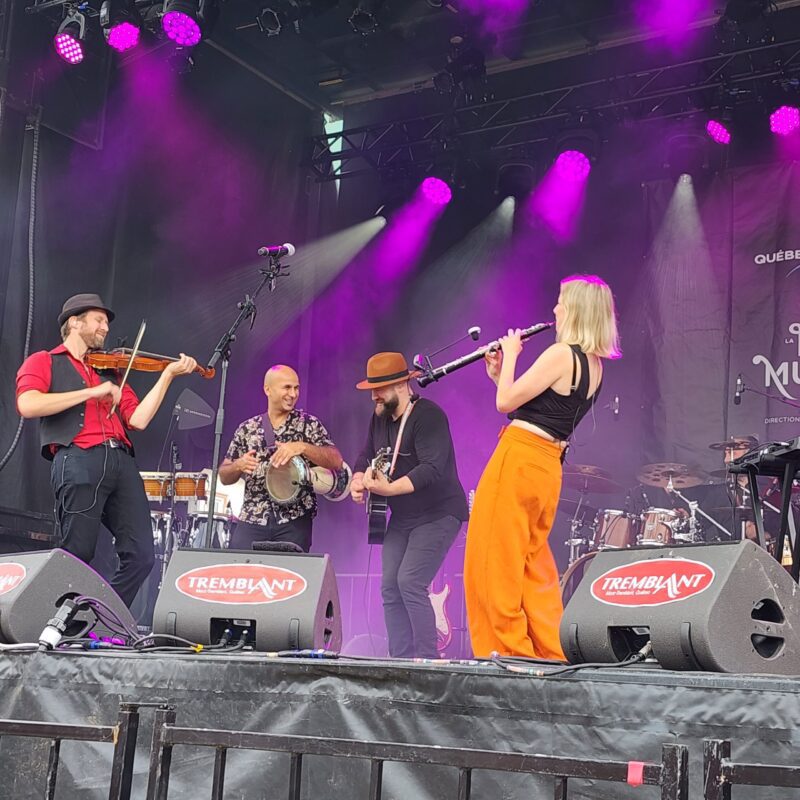
A multicultural, multi-genre group with a predominantly North African flavour, Ayrad is led by Moroccan-born guitarist and composer Hamza Abouabdelmajid, assisted by Annick Beauvais (amplified oboe, bass, vocals), Anit Ghosh (violin, backing vocals), Kattam Laraki-Côté (percussion, backing vocals), Sylvain Plante (drums, percussion) and Gabriel Brochu-Lajoie (bass, keyboard). For a decade now, we’ve been familiar with this North African approach with a rock attitude, incorporating raï, chaâbi, gnawa, Tuareg desert blues, but also funk, Afro-Latin and even Indian bhangra. The Ayrad machine is honed to perfection, and we’re dealing here with serious professionals who’ve been at it for years.
Yves Lambert, new creative cycle at 67
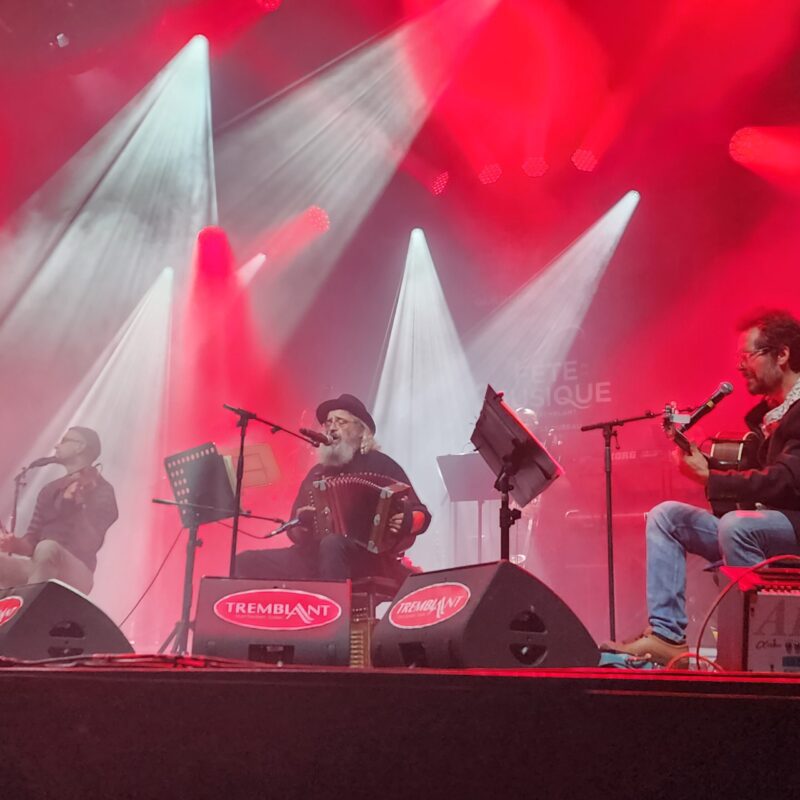
It was written in the sky, our national Yves Lambert would cap the triumphant 90 minutes of his show with a sequence of “La cuisinière” and “Dans nos vieilles maisons”, hits from La Bottine souriante which he left two decades earlier but of which he was the emblematic figure. This audacious and diverse program included a heartfelt tribute to Philippe Bruneau, covers of traditional songs including one by Jean-Paul Guimond and a pair of classics by Oscar Thiffault, as well as original songs and two Bottine Souriante medleys. Since breaking away from la Bottine, Lambert has gone through a number of creative cycles, the most recent of which is now a quartet (vocals, diatonic accordion, violin, guitar, podorythmy), and the forthcoming album relaunches his orchestral ambitions. In this context, Gabriel Schwartz’s arrangements complete the ensemble with four additional instrumentalists (flutes, sopranino sax, bassoon, clarinets, keyboards) and require a delicate sound system to ensure that these beautiful arrangements are perceptible, especially in the most rhythmic sequences of the program’s repertoire. And since this new cycle has only just begun, adjustments are necessary, and we can already foresee that Yves Lambert will soon be fine-tuning all this. Whatever happens, the absolute majority of his fans will be delighted by the proposal, and will see nothing but joy in it.
Serhiy Salov, un hommage à l’Ukraine
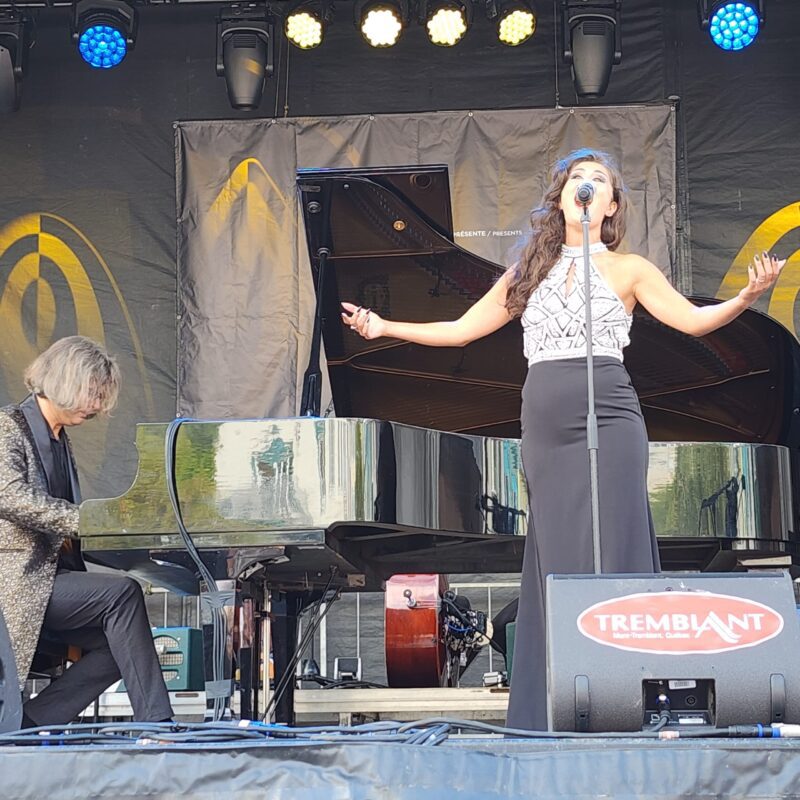
Dimanche midi, le premier concert au programme était donné par le pianiste ukrainien Serhiy Salov, établi à Montréal depuis exactement 10 ans. S’étant produit à maintes reprises sur les scènes montréalaises, le Québécois d’adoption avait reçu la commande d’un hommage à son pays natal dont on sait la souffrance quotidienne. Ainsi, il a joué des compositeurs ukrainiens, romantiques ou modernes, dont Mykola Lysenko, un contemporain de Liszt, ou encore Igor Naoumovitch Chamo et Miroslav Skoryk, ayant tous deux vécu au 20e siècle. Le pianiste jouera également la 12e étude de Chopin op 10, dont le pays d’origine jouxte l’Ukraine. Le compositeur avait écrit cette étude tempétueuse après avoir appris la reconquête de Varsovie ar les troupes russes pendant l’insurrection polonaise de novembre 1830 contre les abus de la tutelle russe. Parallèle évident avec l’actuelle tentative russe de dominer l’Ukraine, il va sans dire, et tout à fait compatible au style intense de Salov, pour employer un euphémisme. « Dessert ou digestif », au programme, une chanteuse azérie (qui fut réfugiée vu la guerre) s’est jointe au pianiste. Accompagnée de son hôte, la soprano Irane Ibragimli chantera ce requiem de guerre de Miroslav Skoryk, une pièce de circonstance dans le contexte de la guerre qui fait rage en Ukraine… et dont Serhiy Salov est un fier partisan.
The Lost Fingers
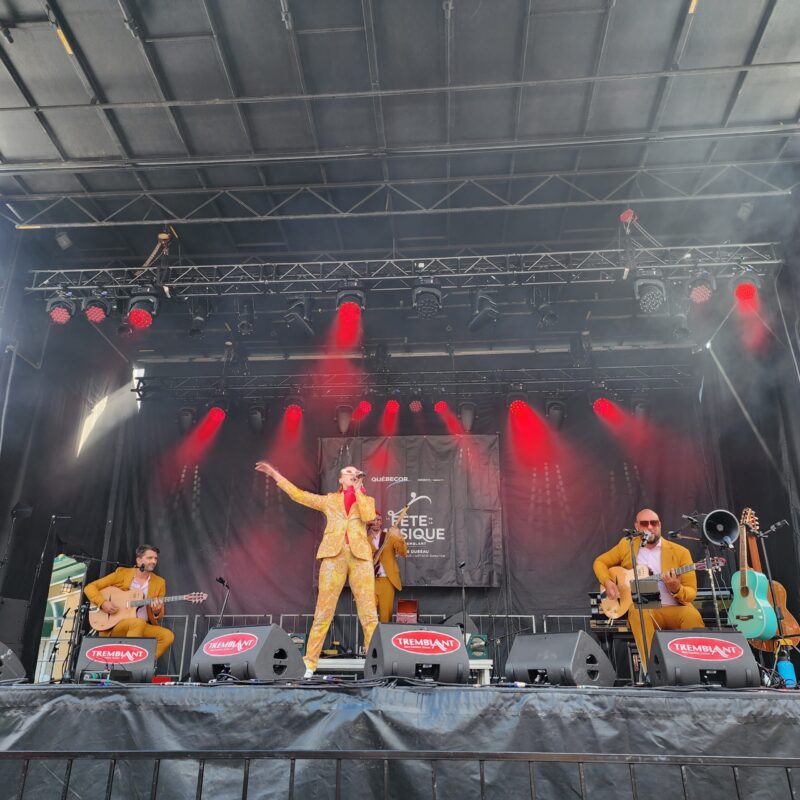
We’ve known The Lost Fingers since the decade of 2000, the latest incarnation dating back to 2014: Valérie Amyot, vocals, François “La Mitraille” Rioux, lead guitar, Byron Mikaloff guitar, Alex Morissette, bass. Originally inspired by gypsy jazz, The Lost Fingers have built a repertoire based on both guitar virtuosity and a hybrid repertoire between gypsy jazz and pop culture, including lively rereadings of hits such as Pump It Up. Clearly, the concept is still finding takers, as the crowd responded very well..
Lengaïa Salsa Brava, que calor!
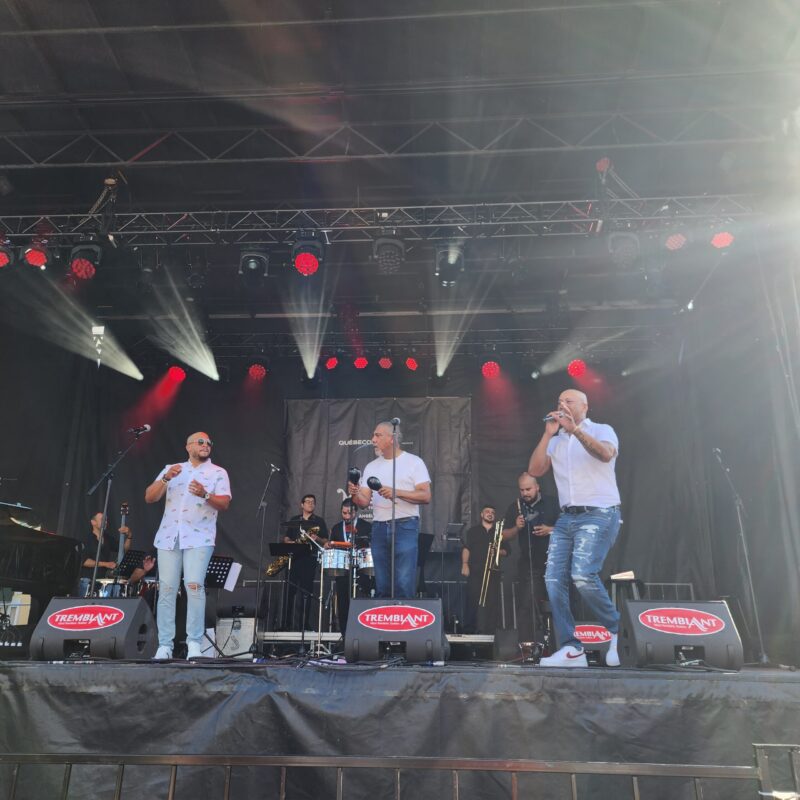
Lengaïa Salsa Brava is a Latin combo founded in Montreal in 2012 by Guyanese trombonist Giany-Frantz Huyghues-Despointes. Like Montreal, Lengaïa is multicultural: its members come from 7 different countries: French Guiana, Cuba, Colombia, Peru, Quebec, Spain and Venezuela. Needless to say, its members communicate in the three languages they use on a daily basis: French, English and Spanish. In keeping with the instrumentation of the best Latin orchestras in the 3 Americas, this ensemble is made up of three trombones and a baritone saxophone, a section of three percussionists, a double bassist, a pianist and three singers. The real deal! In 2023, Lengaïa released a 3rd studio album, Estética de un Rumbero, from which the Tremblant audience was treated to some invigorating excerpts. Salsa, rumba, guaguanco, cha-cha-cha, bachata, Latin jazz and other Afro-Latin rhythms power this well-oiled machine. Make no mistake, Lengaïa is not a token Latin band, the by-product of a nostalgic diaspora. Indeed, there’s every reason to be amazed by the quality of execution of these excellent musicians, perfectly united and inspiring the dancers on Place Saint-Bernard, where the main stage is located in the heart of the pedestrian village.
Diane Juster’s resurrection with Angèle Dubeau & La Pietà
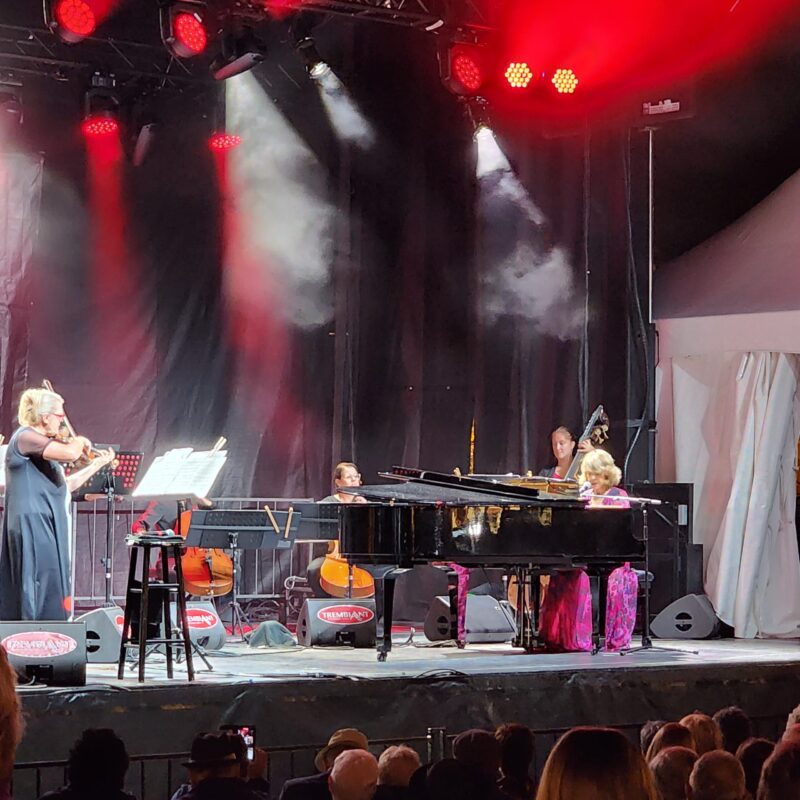
Every Fête de la musique culminates in Angèle Dubeau and La Pietà adding a special guest to their Sunday program. On November 27, she will be at the Maison symphonique with a special program, all Philip Glass and Ludovico Einaudi, from which she played a few excerpts to a packed house: on the Glass side, “Opening” and the first movement of his Symphony No. 3 for strings, on the Einaudi side, “Experience” and “Choros”. This was followed by Saint-Saëns’ “Danse macabre”, performed in spite of a somewhat laborious sound system and the dampness that also affected the instruments – it has to be said that expertise in outdoor sound systems for string ensembles is rare, as these classical ensembles generally play indoors, without contact microphones. Next up was 9-year-old prodigy Iza Kamnitzer, performing the Hommage à l’Ukraine. After performances of Enescu’s “Rhapsodie roumaine” and two Einaudi titles, a “grande dame de la chanson”, to use Angèle Dubeau’s expression, appeared. Diane Juster, whom very few people have seen on stage for many years, agreed to come and perform her classics, all songs of passionate love: “À ma manière”, “J’ai besoin de parler”, “Ce matin” and the essential “Je ne suis qu’une chanson” that became a huge hit by Ginette Reno . At the very least, an instructive dive into the 70s…
